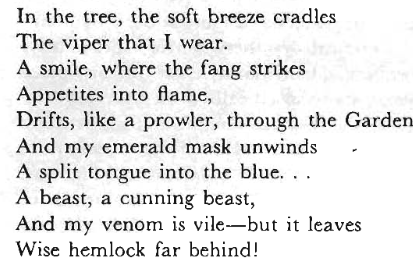Articles/Essays – Volume 03, No. 1
A Translation of Paul Valery’s “Ebauche D’un Serpent”: Introduction
Mormon theology denies the orthodox Christian doctrines of Creation and the Fall: it teaches that not only God has independent being within himself, but also the essential intelligence of each man (which is genuinely related to God’s own), the basic elements of the universe—both spirit and matter or energy, and the physical and moral laws which describe reality and development toward Godhood; God did not create from nothing, but brought new organization and meaning to an eternally self-existent environment. And Adam *(or Eve) did not flaw God’s plans but was a great moral hero who helped in the difficult process of placing man in a new and unmastered situation where opposition, free choice, and real growth would exist; the Fall is fortunate for man and intended by God. Valery’s poem gives a reader experience with an unusual vision of these matters and their implications for man’s attitudes toward himself and his intelligence. The nature and significance of that vision are suggested in the introduction by fames L. McMichael, a young poet and author of THE STYLE OF THE SHORT POEM who teaches at the University of California at Irvine. R. A. Christmas, who made this new translation,[1] has published poems in THE SOUTHERN REVIEW and DIALOGUE and is teaching at Sanfose State College. He says of the form he has used, “I found very early in the work that with this poem at least it was impossible to simply superimpose the English tetrameter on the French eight-syllable line. Instead, I chose trimeter (English six-syllable) as the norm. This has resulted in a certain concision that may annoy expert readers of French. But for the most part, the shorter line delivers the rhythm and tone of the original far better.”
Introduction
The story of Western Tradition is one in which Christianity has made repeated attempts to couple with Platonic Idealism. When this has occurred, our civilization has committed itself less to the world immediately before it than to the promise of another, more perfect world somewhere else. It is the job of the Idealist sensibility to imagine this more perfect world; and the more it does so, the more certain it becomes that this world, the real world, is precisely what perfection is not. God, in His ideal perfection, is both boundless and constant. To be at one with Him, the Idealist believes, would be to suffer no longer the incomplete and complete distances of estrangement and death. For God is free of the spatial and temporal limitations that define everything that has been and will be created. And so created matter becomes for the Idealist an object of hate; and according to the extremity of his Idealism he is ready to insist that the creation itself ought never to have occurred.
There have been those who, in the interests of Christianity, have held that the creation was a mistake. The Church declared them heretics and did worse things to them as well. The narrator of Paul Valery’s “Ebauche d’un Serpent” is clearly not intended as a spokesman, heretical or otherwise, for Christianity. But it is inevitable that the general atmosphere of Christianity enter into any piece of Western literature, and the poem invokes more specifically from that faith the myth of man’s fall. The myth is related by the serpent himself, and his attitude toward the creation is Idealist in the extreme. God Himself had been pure intelligence, he tells us. Prior to the creation, the Divine Idea was all that was. But God became bored, and in His boredom made the irrevocable mistake of dispersing His pure intelligence into created matter. Whereas before His mistake God had enjoyed immaterial and perfect unity, the act of creation resulted in delineated material forms—forms that were distinct and separate from one another in time and space. As they were separate from one another, so were they separate from Him. His first creation had been the serpent himself, and He endowed the serpent with enough intelligence to recognize that the creation had destroyed the perfection and unity of the undifferentiated Idea. And so the serpent’s damnation resided in his awareness that his own existence was a mistake.
But among God’s other creatures was a more mindless race, a race whom He did not want to know either that their Creator was a bumbler or that they themselves were testimony of His error. He permitted them to live in animal simplicity. They responded instinctually to the creation and were not moved to want to know the perfection of the Idea in its totality. In their mindless innocence, their temporal and spatial separations from one another and from God caused them none of the pain that the serpent experienced. It was his envy of this innocence that moved him to lure Eve to fall into intelligence. Once in that state, she and her race would be aware that they were neither pure mind nor pure body, and the struggle of their dual nature would occasion a pain comparable to the serpent’s own.
Because “Ebauche d’un Serpent” represents the marriage of Christian ethics and Platonic Idealism in so distilled a form, it is one of the most articulate documents of our tradition. But the fact that it is a poem makes it at once something more and something less than philosophical definition. In that something more and less reside all the reasons for reading it.
[1] The authorized English translations of the works of Paul Valery vest exclusively in Bollingen Foundation, New York. Their permission to publish Mr. Christmas’s translation is gratefully acknowledged. This poem will be published in Volume 1 of the Collected Works of Paul Valery, “Poems,” which is now in preparation by Bollingen Foundation.


 Back to full Issue
Back to full Issue

